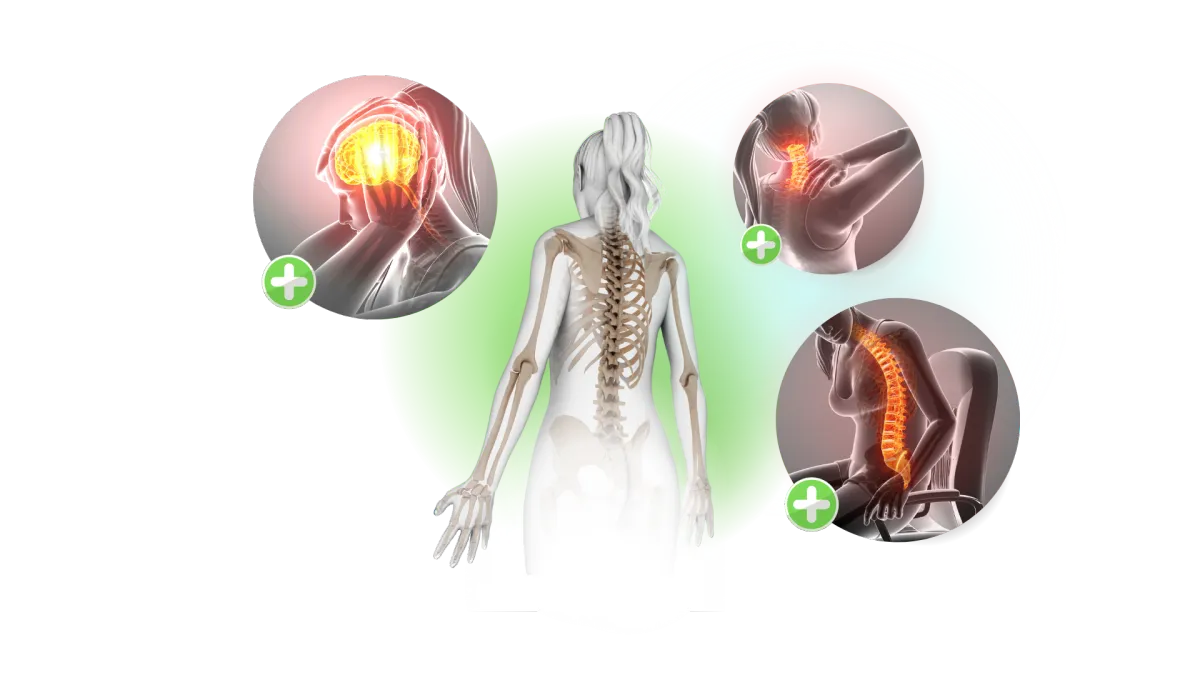Gentle Chiropractic Care in Penrith | Helping You Move Better and Feel More Confident
We help people with persistent back or neck pain move more freely, regain confidence, and get back to doing the things they love — gently, safely, and without forceful “cracking.”
At Your Spinal Health in Penrith, we specialise in gentle, low-force chiropractic care.
Our aim is simple: reduce pain, improve movement, and support your body’s natural healing.
Most people follow a short, structured plan over around 12 weeks and notice steady progress.
Everyone’s different, and results always vary — that’s why your care starts with a personalised Spinal Health Assessment.
Peter Bennett – Chiropractor
Registered with the General Chiropractic Council (Reg No: 01124)
Member of the United Chiropractic Association
Your Spinal Health
Registered chiropractic care in Penrith, Cumbria
5 Poets Walk, Penrith CA11 7HJ · 01768 899 036
Your Trusted Spinal Health Experts
At Your Spinal Health, we are passionate about helping you achieve your best health and well-being. We have been serving our community for over 20 years with a commitment to providing the highest quality care.
Combining natural hands-on treatment with our week-on-week progressive system to help symptoms like back pain, neck pain and headaches.

Start NOW. Just 1-click away
We help people feel safer and more confident moving again.
Save On Your Treatment Costs
Each visit is £50.
Save if you choose to pre pay.

Start NOW. Just 1-click away
Our clients tell us they can do more of what they enjoy once their pain is under control. Everyone’s different, and results vary.
Peter Bennett, Chiropractor – Registered with the General Chiropractic Council (Reg. No: 01124)
I'm Peter Bennett!
Hello, I’m Peter Bennett, a chiropractor based in Penrith, Cumbria.
I’ve spent more than 25 years helping people reduce pain, move better, and get more life back into their years.
My approach is gentle — no cracking, no heavy-handed adjustments — just safe, effective techniques that work with your body instead of against it.
Over the years, I’ve learned that the human body is incredibly good at trying to heal itself. My job is simply to understand what it’s trying to do and give it the right support.
People come to see me for all sorts of reasons — stiff backs after gardening, neck pain from long hours at a desk, or just feeling less steady than they used to.
Whatever brings you in, my goal is the same: to help you move more easily and feel more confident doing the things you love.
I believe great healthcare starts with kindness, clear explanations, and respect for each person’s pace. You’ll never be rushed or pressured here — just guided gently toward better movement and lasting results.
When I’m not in clinic, I’m usually outdoors walking in the fells, writing about longevity science, or creating online programs that help people stay active and independent later in life.

Why I Do This
When I first started in chiropractic, I thought the job was all about fixing spines.
But over the years, I’ve realised it’s really about helping people trust their bodies again.
I’ve seen how back pain can slowly chip away at someone’s confidence — the way they move, work, even how they laugh. One day it’s just a niggle, and before long it’s changed how they live. Helping someone turn that around, gently and safely, is still the best part of my week.
I’ve always believed the body isn’t broken — it’s doing its best to protect you. My role is to understand what it’s trying to do and guide it back toward balance. That might mean easing tension in the spine, retraining movement, or simply helping you breathe a little easier.
What keeps me going is seeing people realise they can do more than they thought — walking the fells again, picking up grandchildren, or just waking up without that constant stiffness.
It’s those moments that remind me why I chose this path all those years ago.
My aim has never been just to treat backs — it’s to help people move freely, live fully, and enjoy their years with confidence.
FAQS
What conditions can we help with?
Spinal health care can help a wide range of conditions, including back and neck pain, headaches, sciatica, joint pain, and even issues related to posture. It's not just about addressing the symptoms; it's about improving your overall health and well-being by improving the health of your spine and nervous system. If you have specific concerns or questions about your condition, please don't hesitate to ask for a consultation to discuss how spinal health care can benefit you.
Is spinal health care safe, and are the adjustments painful?
Spinal health care is generally considered safe when performed by trained professionals. The adjustments are typically not painful; in fact, many clients report feeling relief and improved mobility after an adjustment. Our therapists are highly skilled and will use gentle techniques tailored to your individual needs. Your comfort and safety are our top priorities, and we will explain every step of the process to ensure you feel at ease during your sessions.
How many visits will I need to see results?
The number of sessions you'll need depends on various factors, including the nature and severity of your condition, your overall health, and your treatment goals. Some clients experience relief after just a few sessions, while others may require more ongoing care. During your initial Spinal Health Assessment, we will assess your specific situation and provide a personalised treatment plan. Our goal is to provide efficient and effective care, so you can return to a pain-free and healthy lifestyle as soon as possible.
When should I see my doctor instead of a chiropractor?
Most back or neck problems are mechanical and respond well to gentle chiropractic care.
See your GP or call NHS 111 if you have fever, weight loss, cancer history, night sweats, recent trauma, numbness in the saddle area, bladder or bowel changes, severe unrelenting pain, or sudden weakness.
Call 999 immediately if you notice stroke signs —
Face drooping, Arm weakness, Speech changes, Time to call 999 (FAST) — or sudden dizziness, vision loss, or a severe new headache.
If you’re unsure, call us — we’ll help you decide the safest next step.

Your Senses Depend on Your Spine: Here’s Why That Matters
Everyday Life Depends on Your Senses
When you wake up in the morning, the first thing you do is use your senses. You open your eyes to see the daylight, hear the kettle boiling, smell the coffee, taste your breakfast, and feel the warmth of the cup in your hands.
It’s easy to take these senses for granted—until something goes wrong. Blurred vision, ringing in the ears, numb fingers, or poor balance are all signals that something in the body isn’t working as it should. But what many people don’t realise is that the health of your spine plays a huge role in how well your senses work.
The Nervous System Controls Everything
One of the best-known anatomy books puts it simply:
“The nervous system controls and coordinates all the functions of the body and relates the individual to his environment.”–Gray’s Anatomy
That means every sensation you experience—sight, sound, smell, taste, touch, and even your sense of balance—depends on your nerves carrying messages between your body and your brain.
Your spine is the protective case around those nerves. When it’s aligned and moving well, signals travel freely. But when it’s misaligned or restricted, the messages can get distorted, delayed, or blocked.
Did You Know? Your Brain Creates Your Reality
You don’t actually experience reality directly. What you “see, hear, or feel” is your brain’s construction, built out of the electrical signals travelling through your nerves.
If those nerves are irritated, pinched, or misfiring, your brain is working with faulty information. That means your experience of reality itself can be altered—through blurred vision, ringing in the ears, dizziness, or tingling sensations.
How Spinal Misalignment Can Affect Your Senses
Think of your nerves like electrical wires carrying information. If the wiring is pinched or frayed, the signal isn’t clear.
A misaligned neck can irritate the nerves linked to your eyes, ears, and balance centres.
Pressure in the middle back can change how nerves control touch and strength in your arms and hands.
Lower back problems can affect the nerves to your legs, feet, and sense of balance.
The result? Strange sensations like tingling, numbness, or altered perception of the world around you.
What This Blog Series Will Cover
Over the next few weeks, I’ll be diving into each sense in turn and showing how your spine can affect it:
Sight– blurred vision, headaches, eye strain.
Hearing and Balance– tinnitus, dizziness, vertigo.
Smell and Taste– how your brain processes flavour and scent.
Touch– tingling, numbness, pins and needles.
Body Awareness (Proprioception)– your “hidden sense” of movement and balance.
My goal is to explain in simple terms how the spine and nervous system work together, so you can understand your symptoms better—and know what you can do to protect your health.
Takeaway: Protect Your Spine, Protect Your Senses
Your senses are not separate from your spine. They rely on clear, open communication through the nervous system. And as Gray’s Anatomy reminds us, the nervous system is in charge of everything.
When you look after your spine, you’re not just protecting your back—you’re protecting the way you see, hear, feel, taste, and experience the world.

Email [email protected]
Your Spinal Health – Chiropractic Care in Penrith, Cumbria
Peter Bennett – Chiropractor (Reg. No: 01124)
Registered with the General Chiropractic Council and Member of the United Chiropractic Association.
This website provides general information only and is not a substitute for personal professional advice. Results vary between individuals.
If you experience severe or worsening symptoms — especially weakness, numbness, or bladder/bowel changes — seek urgent medical attention.
